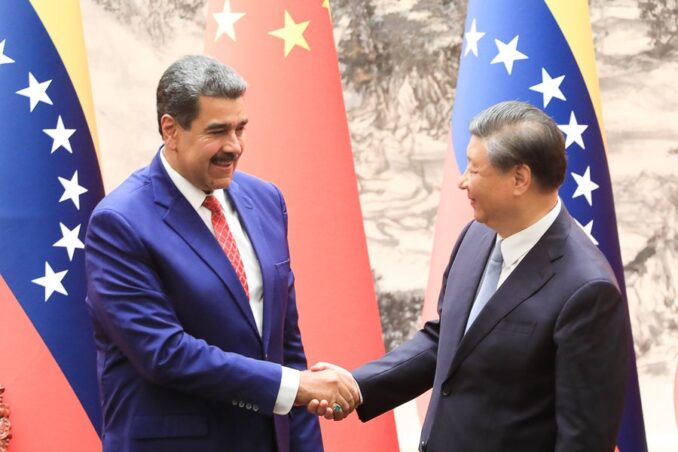China and Venezuela to Establish ‘All-Weather Strategic Partnership’

Presidents Nicolás Maduro of Venezuela and Xi Jinping of China in Beijing, Sept. 15, 2023.
By Andreína Chávez Alava
The following article was posted Sept. 15 on venezuelanalysis.com.
Caracas
Venezuelan President Nicolás Maduro has wrapped up a six-day visit to China with a meeting with President Xi Jinping at the Great Hall of the People in Beijing to strengthen political and economic ties.
In a joint statement on Wednesday, the two leaders announced they would upgrade their countries’ relations to an “all-weather strategic partnership.” This is a high category reserved by the Chinese government for important diplomatic partners. Venezuela is the first Latin American country to reach this level.
The new partnership will “expand practical binational cooperation in various fields and strengthen collaboration in international affairs so as to improve the welfare of their peoples and jointly promote the construction of a new world,” read the statement.
President Xi highlighted that China “has always viewed its relations with Venezuela from a strategic and long-term perspective.” The Chinese leader reiterated his country’s support for the Venezuelan people in the face of foreign interference. In recent years, the Caribbean nation has been through an economic crisis exacerbated by the imposition of unilateral sanctions by the United States and its European allies.
“The establishment of an all-weather strategic partnership between China and Venezuela meets the common expectations of the two peoples and conforms to the general trend of historical development,” Xi said during the meeting.
For his part, President Maduro said that establishing an all-weather strategic partnership “is of historic significance and will surely usher in a new era of bilateral relations.” He thanked Beijing for supporting Venezuela in the face of the hardships caused by the US-led economic blockade, especially during the COVID-19 pandemic.
The Venezuelan leader added that his country would continue to back China’s Belt and Road Initiative, as well as the internationalization of the yuan, and is also willing to cooperate with Beijing in multilateral forums such as the BRICS [Brazil, Russia, India, China, South Africa] group and the United Nations.
During his stay in China, Maduro visited the New BRICS Development Bank in the city of Shanghai, where he met with the bloc’s leader, former Brazilian President Dilma Rousseff. In an interview with Chinese media, President Maduro praised the organization, saying it represented “the birth of a new world where the Global South has the primary voice.”
On several occasions, Caracas has expressed its willingness to join the BRICS group, highlighting the nation’s extensive natural resources. On Aug. 24, the platform accepted six new partners during a summit held in Johannesburg, South Africa. Venezuela’s application, which was among numerous candidates, did not make the cut, but the bloc reassured other countries that more memberships would be considered in the future.
Following Wednesday’s presidential meeting, Maduro and Xi supervised the signing of 31 bilateral cooperation documents focused on boosting collaboration in areas from oil, scientific development and tourism to “enriching the variety of trade goods.”
The main agreements include China’s support in the construction of Venezuela’s special economic zones (SEZs), poverty reduction efforts and boosting the South American nation’s national electric grid, significantly strained due to a years-long lack of investment.
The allied nations likewise signed an agreement between China Meheco pharmaceutical company and Venezuela’s public health system to transfer technology and knowledge for the maintenance of medical equipment, to build and remodel hospital facilities, as well as to supply medicines and materials to the Caribbean country.
In a special broadcast of his weekly program from China, Maduro went on to highlight that Caracas will begin exporting agricultural products such as coffee and avocados to the Chinese market.
One aspect of the new China-Venezuela alliance that caught international headlines was the agreement for space exploration, which will “take the first Venezuelan man or woman to the moon on board a Chinese spacecraft,” said President Maduro. In July, Venezuela became the first Latin American country to join the China-led International Lunar Research Station (ILRS) to build a base near the moon’s south pole within the next decade.
Additionally, Caracas and Beijing agreed to deepen cooperation between legislative bodies and advance collaboration in industrial, green and sustainable development, mining projects, digital economy, culture and education exchange.
All 31 agreements were signed at the closing of the China-Venezuela XVII High-Level Joint Commission held in Beijing on Wednesday [Sept. 13] and led by Venezuelan Vice President Delcy Rodríguez alongside other high-level Venezuelan and Chinese authorities.
Following his visit to China, President Maduro traveled to Havana, Cuba, to participate in the G77+China two-day summit with some 30 heads of state and governments from Africa, Asia and Latin America. The meeting aims to continue articulating ideas and mechanisms for the establishment of a new economic and political world order led by Global South voices.

